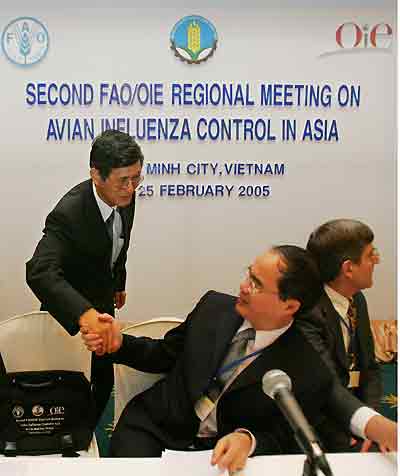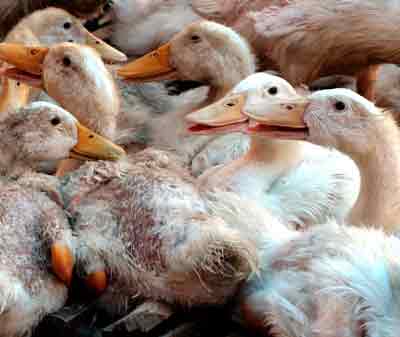|
Asia facing real risk of bird flu pandemic - experts
(Agencies)
Updated: 2005-02-23 15:09
The deadly bird flu virus will take years to eradicate and Asia is now facing the serious risk of a pandemic that would cause far greater loss of life than the SARS outbreak, experts told a landmark conference in Ho Chi Minh City.
Delegations from more than 20 countries and organisations, including major donors and United Nations agencies, were seeking to evaluate their understanding of the H5N1 virus and find long-term measures to get rid of it.

World Health Organization Regional Director Dr. Shigeru Omi (L) greets Vietnam's Nguyen Tien Nhan, Vice-Chairman of the People's Committe of HCMC, at the opening ceremony of a three-day conference on Avian influenza Control in Ho Chi Minh City, February 23, 2005. Asia's deadly bird flu will persist for many years and a global effort is needed to stop the virus from spreading and prevent a human pandemic, the U.N. agency said on Wednesday. [Reuters] |
"It is in the interest of both developed and developing countries to invest in the control and containment of avian influenza," said Samuel Jutzi, the Food and Agriculture Organisation's director of animal production and health.
"There is an increasing risk of avian influenza spread that no poultry keeping country can afford to ignore.
"We must assume that avian influenza will persist for many years in some of the countries that had disease outbreaks in 2004-2005," Jutzi told the conference.
Bird flu has been discovered in eight countries since late 2003 -- Vietnam, Cambodia, Thailand, China, Indonesia, Japan, Laos and South Korea.
Thirty-three people have died in Vietnam since then in several outbreaks. Another 12 have died in Thailand.
Dr. Teruhide Fujita, from the World Organisation for Animal Health (OIE), echoed the warning. "Immediate eradication of the disease in the region cannot be envisaged in the short term under the current situation," he said.
Fujita noted that "ducks can act as reservoirs of infection with or without clinical signs and are capable of excreting large amounts of viruses into the environment."
Scientists fear a possible mutation of the virus that could unleash a global pandemic, and ways of eradicating the virus for good will top the agenda.
"We at WHO believe that the world is now in the gravest possible danger of a pandemic," said Dr. Shigeru Omi, director of the WHO's Western Pacific office.
"The health impact in term of death and sickness will be enormous and certainly much greater that SARS", he said referring to the Severe Acute Respiratory Syndrome that killed nearly 800 people two years ago.
However, at a press briefing after the opening session, Omi said the bird flu virus had not yet "gained the potential for efficient human-to-human transmission."
He also said it was difficult to predict when a human vaccine against the disease would be available.

Ducks are seen at a farm in northern Ha Tay province, 20 km (12.4 miles) south of Hanoi, February 23, 2005. [Reuters] |
FAO's director of animal health Joseph Domenech said eradication of the virus in poultry "will come in many years." But, he added, "controlling can be done today. With more investment, it is possible to control the effect of the disease."
While "there is a lot of focus put on human health," Domenech said, "we hope governments will put the focus on the source."
Scientists have long warned further outbreaks of the disease are inevitable in the region as long as humans live cheek by jowl with livestock. Animal husbandry practices across the entire region need to be changed.
The conference will also try to strengthen regional cooperation and information, as several countries were accused last year of deliberately covering up outbreaks.
Delegates would be expected to consider as well why some countries have been more affected than others.
Conference host Vietnam, which has seen 13 human deaths from the virus this winter is on the frontlines of the disease whereas China, with its huge populations, both human and poultry, has reported hardly any cases this year.
"It would be highly interesting to listen to the Chinese report," Jutzi said, suggesting that "they may have been lucky" in addition to taking measures such as vaccinating the poultry against the virus.
The conference, jointly organized by the OIE and the FAO, is being held an hour's drive from the mouth of the Mekong delta where the poultry population has been decimated since last year.
|